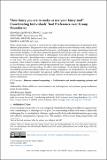| dc.contributor.author | Zhang, Qianqia (Queenie) | |
| dc.contributor.author | Park, Soya | |
| dc.contributor.author | Muller, Michael | |
| dc.contributor.author | Karger, David R. | |
| dc.date.accessioned | 2024-03-01T17:01:54Z | |
| dc.date.available | 2024-03-01T17:01:54Z | |
| dc.date.issued | 2024-02-16 | |
| dc.identifier.issn | 2573-0142 | |
| dc.identifier.uri | https://hdl.handle.net/1721.1/153629 | |
| dc.description.abstract | When a group makes a decision, it necessitates the understanding and amalgamation of information from different group members. This process becomes particularly intricate in cross-boundary teams, which consist of individuals from diverse organizational backgrounds, each bringing in unique informational tools and representation modalities. People share information generated from their personal tools, and the variance in representation of such information makes it challenging to form cohesive group decisions. We conducted workshop studies with 11 knowledge workers to understand current practices of tool adaptation and negotiation in such teams. The results indicate a reluctance to adopt new tools due to perceived violations of social acceptance, often leading to negative judgments of those suggesting new tools. Consequently, participants in cross-boundary teams gravitated towards their preferred tools, complicating the aggregation of inputs and impeding cohesive decision-making. To address these challenges, we developed a platform facilitating sensemaking and decision-making without necessitating compromises on tool preferences. In our mixed-method within-subject experiments, this approach enabled faster, more informed decision-making with reduced mental load and increased engagement through enhanced social interaction and acknowledgment of diverse contributions. | en_US |
| dc.publisher | Association for Computing Machinery (ACM) | en_US |
| dc.relation.isversionof | 10.1145/3633069 | en_US |
| dc.rights | Creative Commons Attribution | en_US |
| dc.rights.uri | https://creativecommons.org/licenses/by/4.0/ | en_US |
| dc.source | Association for Computing Machinery | en_US |
| dc.subject | Computer Networks and Communications | en_US |
| dc.subject | Human-Computer Interaction | en_US |
| dc.subject | Social Sciences (miscellaneous) | en_US |
| dc.title | "How fancy you are to make us use your fancy tool": Coordinating Individuals' Tool Preference over Group Boundaries | en_US |
| dc.type | Article | en_US |
| dc.identifier.citation | Zhang, Qianqia (Queenie), Park, Soya, Muller, Michael and Karger, David R. 2024. ""How fancy you are to make us use your fancy tool": Coordinating Individuals' Tool Preference over Group Boundaries." Proceedings of the ACM on Human-Computer Interaction, 8 (GROUP). | |
| dc.contributor.department | Massachusetts Institute of Technology. Computer Science and Artificial Intelligence Laboratory | |
| dc.contributor.department | Massachusetts Institute of Technology. Department of Electrical Engineering and Computer Science | |
| dc.relation.journal | Proceedings of the ACM on Human-Computer Interaction | en_US |
| dc.identifier.mitlicense | PUBLISHER_CC | |
| dc.eprint.version | Final published version | en_US |
| dc.type.uri | http://purl.org/eprint/type/JournalArticle | en_US |
| eprint.status | http://purl.org/eprint/status/PeerReviewed | en_US |
| dc.date.updated | 2024-03-01T08:47:17Z | |
| dc.language.rfc3066 | en | |
| dc.rights.holder | The author(s) | |
| dspace.date.submission | 2024-03-01T08:47:17Z | |
| mit.journal.volume | 8 | en_US |
| mit.journal.issue | GROUP | en_US |
| mit.license | PUBLISHER_CC | |
| mit.metadata.status | Authority Work and Publication Information Needed | en_US |
